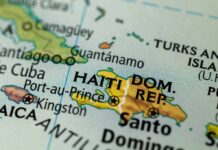
This deportation highlights a disturbing intersection of immigration law and veterans’ service, sparking outrage among those who value the sacrifices of our military heroes.
Story Highlights
- The deportation of decorated veteran Jose Barco raises legal and moral questions.
- Barco served two tours in Iraq but was deported after a felony conviction.
- His case underscores systemic failures in processing citizenship for non-citizen veterans.
- Advocates argue deportations ignore the impact of combat trauma on veterans.
Deportation of a Decorated Veteran
On November 14, 2025, Jose Barco, a Venezuelan-born U.S. Army veteran and Purple Heart recipient, was deported to Mexico by U.S. Immigration and Customs Enforcement (ICE). Despite his distinguished military service, Barco faced deportation after serving a prison sentence for a 2008 shooting in Colorado. The case has provoked intense debate over the treatment of immigrant veterans and the complexities of immigration law.
Barco’s deportation illustrates a broader issue within the U.S. immigration system. Non-citizen veterans often face deportation due to legal complexities and procedural failures, despite promises of expedited citizenship for those who serve. Barco applied for citizenship while deployed, but his paperwork was reportedly lost, leaving him vulnerable to deportation after his conviction.
Watch:
Legal and Moral Complexities
Barco’s legal troubles began in 2008 when he was involved in a shooting at a Colorado Springs house party that injured a pregnant woman. Convicted of attempted murder and felony menacing, he was sentenced to over 50 years in prison. After serving 15 years, he was paroled but immediately detained by ICE under policies prioritizing the removal of non-citizens with felony convictions. This case highlights the intersection of criminal justice and immigration law, raising questions about how veterans with combat trauma should be treated.
Advocacy groups continue to protest the deportation, citing Barco’s combat injuries and potential PTSD as mitigating factors. They argue that his military service should afford him leniency. Despite these efforts, Barco’s legal avenues for return appear exhausted, leaving his family in the U.S. facing emotional and financial hardship.
DUKE: ICE Just Deported A Heroic Purple Heart Recipient… Who Also Shot A Pregnant Woman – Conservative Review https://t.co/lVatEQKkAB
— ConservativeLibrarian (@ConserLibrarian) November 18, 2025
Impact on Veterans and Immigration Policy
Barco’s deportation has broader implications for immigration policy and veterans’ affairs. It underscores the need for reform in how the U.S. processes citizenship for military service members and addresses the mental health challenges faced by veterans. The case has drawn attention to the precarious situation of non-citizen veterans and the bureaucratic obstacles they face in securing their status.
The controversy surrounding Barco’s deportation also reflects ongoing political scrutiny of ICE practices and the enforcement of immigration laws. As the debate continues, it raises critical questions about the balance between upholding the law and recognizing the sacrifices made by those who serve in the military.
Sources:
Denver7 News
FOX 10 Phoenix
Daily Caller
News From The States

























